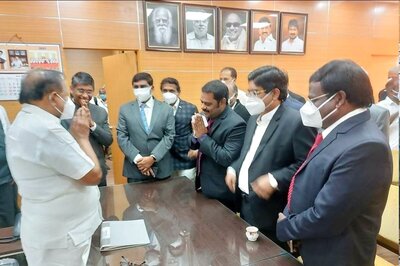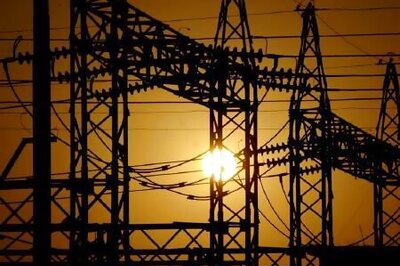
views
Not so with the Tsunami. Today marks a year since that killer wave mauled the Indian coastline- and so much of Asia- a story I think no journalist who covered it can forget.
The Tsunami struck at about 9.30 in the morning of December 26th- by noon I was at the technical airport in Delhi with my crew- waiting to get on board a plane to Chennai that had been commandeered by two ministers. No clue that the next month would be the most hectic, most tiring, and most draining time of my life. The Tsunami changed the geography of several islands I flew over in the Indian Ocean- mentally it changed me - forever.
Here's an excerpt from a journal I wrote around that time:
(December 27th DAY 2: This day seems most blurred in my memory-I said in a phone report that beaches all the way down Tamil Nadu's coastline had been turned into funeral grounds. The Tsunami hit mostly fishermen communities here, who lived along the coastline, and I think if anyone took a boat down the coast all they would see is mass graves, and funeral pyres dotting the beaches. Why is this story beginning to affect me - I have seen dead bodies before, I have covered tragedy so many times- death, disaster, destruction are the staple for any news organization, and there is so much of it in South Asia. I guess the answer is the numbers involved- but there's more. For that first week after the Tsunami hit- we visited so many families, attended so many funerals, spoke to so many people made homeless overnight, so many parents mourning children - that after a while, our own reality seemed to fade. I can speak for myself- as we uncovered more and more areas hit by the Tsunami, I forgot that there was much of a world outside the Tsunami. It seemed like the whole world had been swallowed up by this whirling wave- and we were somehow still traveling inside the storm.
We also heard some people were moving into a nearby school- and even as we entered the school, we saw more and more people arrive. They all had this sort of hollow, exhausted look- I'll never forget the image of three children all huddled together and asleep. We didn't wake them up to ask, but even as they slept soundlessly, their arms closely linked to each other- it wasn't hard to imagine the fear and horror of all they had witnessed.)
A year later- many Tsunami victims have found ways to triumph over their tragedies. Just at our channel - Nilanjana Bose, Divya Iyer, and all our fab correspondents down south have chronicled amazing stories. Women that lost children, who have since reversed their sterilization to conceive again. Fishermen who overcame trauma and fear to board boats and go back to a sea that took so much away from them. Children who lost parents, sisters, brothers- returning to school and reclaiming their childhood. Traditional tribesmen who overcame their dislike of the outside world to set up shops and businesses. These are all stories of immense courage that show human resilience, dignity and the ability to rebuild and re-invent themselves.
But all this human effort means nothing- if we learn nothing.
In just the past few months we have seen two big disasters in our region. In both cases- rescue was slow- relief and even bigger problem.
And so- 42 waterlogged Chennai residents- living without food or shelter for days - are killed in a relief-line stampede. And 8 people survive the quake in Kashmir- to die of the cold in their flimsy tents.
For the government, 'not being prepared' may be an act of omission, perhaps. But not being able to care for victims of a disaster, to the point of letting more die- That is an act of commission.
If we just hurtle from one natural disaster to the next and the next- then our tributes to Tsunami victims today are pointless. About the AuthorSuhasini Haidar Suhasini Haidar is Diplomatic Editor, The Hindu. Earlier, she was a senior editor and prime time anchor for India's leading 24-hour English news chann...Read Morefirst published:December 26, 2005, 13:49 ISTlast updated:December 26, 2005, 13:49 IST
window._taboola = window._taboola || [];_taboola.push({mode: 'thumbnails-mid-article',container: 'taboola-mid-article-thumbnails',placement: 'Mid Article Thumbnails',target_type: 'mix'});
let eventFire = false;
window.addEventListener('scroll', () => {
if (window.taboolaInt && !eventFire) {
setTimeout(() => {
ga('send', 'event', 'Mid Article Thumbnails', 'PV');
ga('set', 'dimension22', "Taboola Yes");
}, 4000);
eventFire = true;
}
});
window._taboola = window._taboola || [];_taboola.push({mode: 'thumbnails-a', container: 'taboola-below-article-thumbnails', placement: 'Below Article Thumbnails', target_type: 'mix' });Latest News
In the business of 24-hour news a year is an age. So many news flashes, news updates, breaking news situations, sometimes its hard to remember the details of a story we covered a month ago.
Not so with the Tsunami. Today marks a year since that killer wave mauled the Indian coastline- and so much of Asia- a story I think no journalist who covered it can forget.
The Tsunami struck at about 9.30 in the morning of December 26th- by noon I was at the technical airport in Delhi with my crew- waiting to get on board a plane to Chennai that had been commandeered by two ministers. No clue that the next month would be the most hectic, most tiring, and most draining time of my life. The Tsunami changed the geography of several islands I flew over in the Indian Ocean- mentally it changed me - forever.
Here's an excerpt from a journal I wrote around that time:
(December 27th DAY 2: This day seems most blurred in my memory-I said in a phone report that beaches all the way down Tamil Nadu's coastline had been turned into funeral grounds. The Tsunami hit mostly fishermen communities here, who lived along the coastline, and I think if anyone took a boat down the coast all they would see is mass graves, and funeral pyres dotting the beaches. Why is this story beginning to affect me - I have seen dead bodies before, I have covered tragedy so many times- death, disaster, destruction are the staple for any news organization, and there is so much of it in South Asia. I guess the answer is the numbers involved- but there's more. For that first week after the Tsunami hit- we visited so many families, attended so many funerals, spoke to so many people made homeless overnight, so many parents mourning children - that after a while, our own reality seemed to fade. I can speak for myself- as we uncovered more and more areas hit by the Tsunami, I forgot that there was much of a world outside the Tsunami. It seemed like the whole world had been swallowed up by this whirling wave- and we were somehow still traveling inside the storm.
We also heard some people were moving into a nearby school- and even as we entered the school, we saw more and more people arrive. They all had this sort of hollow, exhausted look- I'll never forget the image of three children all huddled together and asleep. We didn't wake them up to ask, but even as they slept soundlessly, their arms closely linked to each other- it wasn't hard to imagine the fear and horror of all they had witnessed.)
A year later- many Tsunami victims have found ways to triumph over their tragedies. Just at our channel - Nilanjana Bose, Divya Iyer, and all our fab correspondents down south have chronicled amazing stories. Women that lost children, who have since reversed their sterilization to conceive again. Fishermen who overcame trauma and fear to board boats and go back to a sea that took so much away from them. Children who lost parents, sisters, brothers- returning to school and reclaiming their childhood. Traditional tribesmen who overcame their dislike of the outside world to set up shops and businesses. These are all stories of immense courage that show human resilience, dignity and the ability to rebuild and re-invent themselves.
But all this human effort means nothing- if we learn nothing.
In just the past few months we have seen two big disasters in our region. In both cases- rescue was slow- relief and even bigger problem.
And so- 42 waterlogged Chennai residents- living without food or shelter for days - are killed in a relief-line stampede. And 8 people survive the quake in Kashmir- to die of the cold in their flimsy tents.
For the government, 'not being prepared' may be an act of omission, perhaps. But not being able to care for victims of a disaster, to the point of letting more die- That is an act of commission.
If we just hurtle from one natural disaster to the next and the next- then our tributes to Tsunami victims today are pointless.


















Comments
0 comment